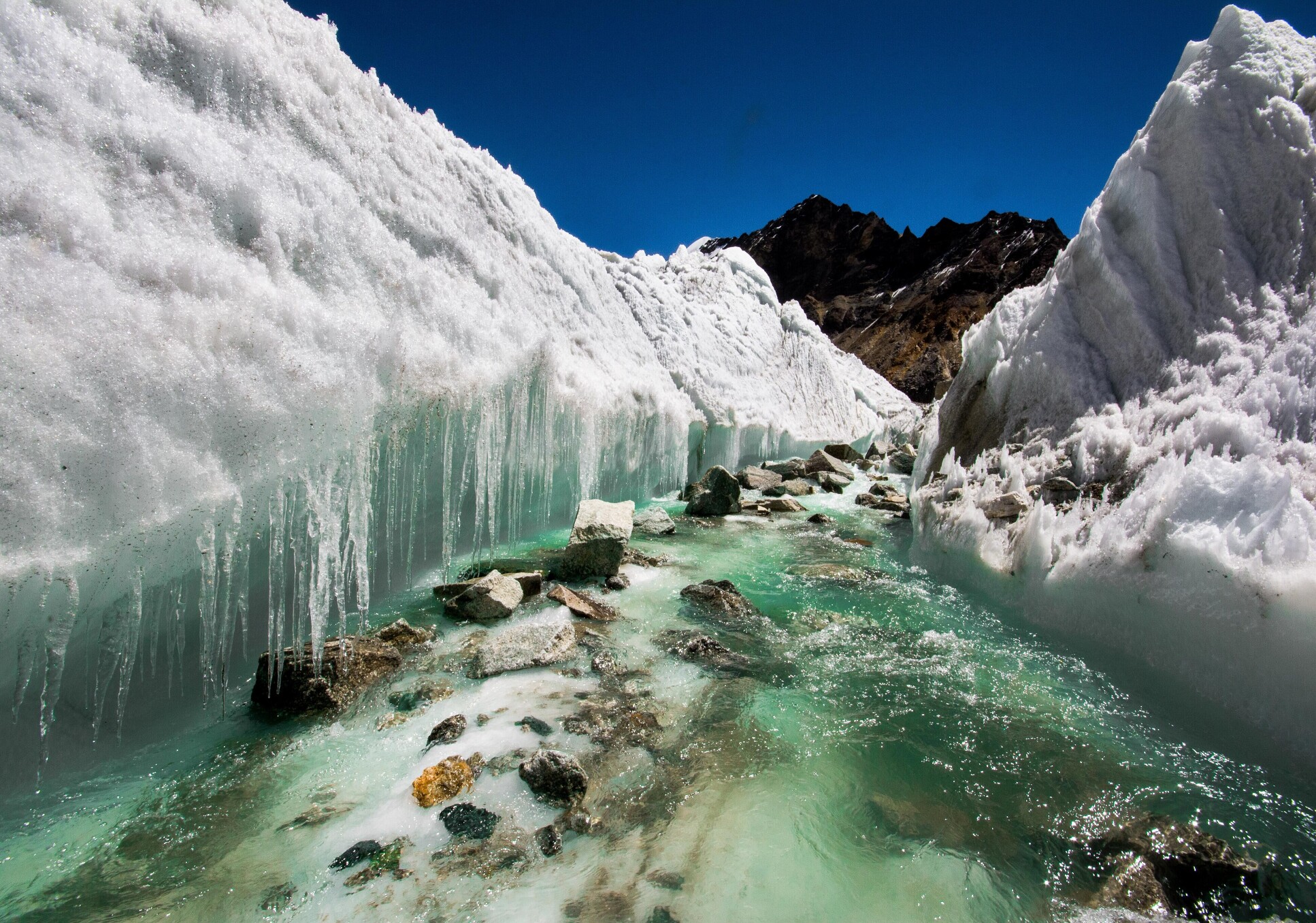Author of major new global report talks about human survival and biodiversity
by Hayley Sykes

Imperial’s Caroline Howe talks about an ambitious project on biodiversity and ecosystems, undertaken by the international environmental community.
This week, the Intergovernmental Panel on Biodiversity and Ecosystem Services (IPBES) published its Nexus Assessment 2022-24. This influential report is the first time that experts of all kinds, from every corner of the globe, have come together to propose a holistic plan of action to address the interlinked crises of biodiversity, water, food, health and climate change. It involved 165 leading international experts from 57 countries, drew on 6,500 references, and took three years to develop.
In this Q and A, Caroline Howe, a lead author of the report and a Senior Lecturer at the Centre for Environmental Policy at Imperial College London, talks to Hayley Sykes about its findings and why action to halt and ideally reverse the rate of biodiversity loss is crucial to our survival as a species.
What is the biodiversity nexus?
Biodiversity is the fundamental starting point for every living thing’s survival. Ecosystems with a healthy level of biodiversity at the genetic, species and ecosystem levels provide our water, clean our air, underpin our health and gift us medicines.
The ‘biodiversity nexus’ demonstrates the diverse, intertwined and delicate relationships between people and nature, and illustrates how even a small change in one element can trigger a cascade of unintended and often disastrous consequences in another. Despite biodiversity being essential to our very existence, we are allowing it to decline at a terrifyingly exponential rate.
The UK is one of the world’s most nature-depleted countries in the world and our biodiversity continues to disappear before our eyes.
What is the IPBES Nexus Assessment 2022-24 and how did you get involved?
The IPBES Nexus Assessment 2022-24 is a thematic assessment of the interconnections between core issues for humanity, including biodiversity, water, food, health within the context of climate change.
One of IPBES’s strengths is that it is an independent body, operating separately from but complementary to the UN, individual governments, and industry, so it is free to explore the issues from every angle and represents a truly global view.
I remember when IPBES was first launched in 2015 because I was doing my post-doc with one of the founding researchers, Dame Professor Georgina Mace, here at Imperial (and later at UCL) and I was lucky enough to watch it develop from its inception.
I was delighted to later be nominated by Imperial to join the project as a Lead Author and to continue our university’s involvement. It is a prime example of Imperial’s commitment to convergence science.
This report addresses global issues such as water, food, health and climate change. Why is it important to consider these together?
Humans are very good at putting problems into boxes and trying to tackle them in siloes. Sometimes this works and it looks like we’ve fixed the problem, but only if we choose to ignore the cascading negative effects that might spring from it.
For example, spraying a field with pesticides may defend one harvest from being destroyed by crop disease, but these pesticides can leach into the soil and water system. This can invisibly and slowly poison the organisms which are essential for pollination and providing the crops with nutrients, which jeopardises the success of future harvests and the wider ecosystem.
This report proposes a new way of broader thinking and moves us away from the idea that we must solve environmental issues one problem at a time, like ticking items off a list. It also emphasises that one issue is not any more important than another. Over the past decade we have concentrated a lot of time and attention on the urgency of slowing down climate change, but these efforts would be more effective if we viewed climate change as just one part of the puzzle, which is intricately connected to biodiversity and biodiversity loss.
What do you think will happen if action is not taken?
The answer is simple, if we do not take steps to halt, or ideally reverse, the rate of biodiversity loss, we will not survive as a species. Dr Caroline Howe Senior Lecturer in Environmental Social Science
The impact of an unstable biodiversity nexus is felt unequally around the globe, and often those who are worse affected are not those whose actions are driving that inequality.
In the ‘Global North’ we can even be oblivious to the impact we are having because over the generations we have lost our connection with nature.
For example, the medicines we are prescribed today are laboratory-designed and factory-made, and we forget that their origins often lie in the natural world.
The bacteria and viruses that make us ill are yet another living thing and form of biodiversity. We are using one element of nature to combat another.
The recommendations are based on feedback from experts from 57 countries. What was it like working with such a broad international collaboration?
This experience has been a highlight of my career so far. I have enjoyed lively, often intense, debates and met fascinating people who have made me look at the world from an entirely new viewpoint.
For example, the Nepali contributors explained how they consider Nepal to be the beating pulse of the world because of how the meltwater from the Himalayas feeds into so many water systems and the snows and ice provide a cooling effect on the world’s climate system. I had never previously considered how powerful an influence mountain ranges have on our water supply.

One of the key strengths of this report is that the knowledge and opinions coming from the lived experience of indigenous local community representatives was given equitable input and consideration alongside the evidence coming from more traditional academic voices.
As university researchers from the ‘Global North’ we must be mindful that we don’t project our cultural perception of what ‘development’ is, or should be, onto other communities. This is especially relevant in discussions around equitable access to, and use of, the world’s natural resources where history clearly shows how a small collection of countries has unfairly dominated the majority.
In most cases, the solutions to environmental problems that have the greatest longevity and impact are ones that take inspiration from existing community-led solutions and scale them up to futureproof that approach against the growing pressures of biodiversity loss and climate change.
And we need to be more willing to accept that solutions do not always have to be technologically based. In an area of Kenya, communities had for centuries dug traditional open irrigation channels to collect and distribute rainwater, but to modernise the system these were replaced by a network of underground pipes. The unintended consequence was an increase in conflict between communities as the less visible and less flexible system resulted in a water supply that was perceived as inequitable.
This report provides a range of response options, many of which are currently being implemented at a small scale, or which can be easily adapted at a low-cost to other contexts.
What are the top three messages you would want anyone reading this report to remember and share?
Firstly, biodiversity is essential for our survival. This planet is our home and it’s the only one we will ever have. We must protect and care for it. Dr Caroline Howe
Secondly, significant change can only come about if countries work hand in hand, but action at an individual level can still make a difference. Everyone should feel empowered that they are part of a collective global effort.
Lastly, we can still be optimistic in the face of such intense environmental crises. This report shows that humans as a species can work together and agree on a practical approach to overcome challenges.
The report provides a suite of over 70 response actions, many of which are low cost and readily available now. It gives me hope!
More information on the IPBES Nexus Assessment
The Assessment Report on the Interlinkages Among Biodiversity, Water, Food and Health – known as the Nexus Report - offers decision-makers around the world the most ambitious scientific assessment ever undertaken of these complex interconnections and explores more than five dozen specific response options to maximize co-benefits across five ‘nexus elements’: biodiversity, water, food, health and climate change.
Building on previous IPBES reports, in particular the 2022 Values Assessment Report and the 2019 Global Assessment Report, which identified the most important direct drivers of biodiversity loss, including land- and sea-use change, unsustainable exploitation, invasive alien species and pollution, the Nexus Report further underscores how indirect socioeconomic drivers, such as increasing waste, overconsumption and population growth, intensify the direct drivers – worsening impacts on all parts of the nexus.
The majority of 12 assessed indicators across these indirect drivers – such as GDP, population levels and overall food supply, have all increased or accelerated since 2001.
Article text (excluding photos or graphics) © Imperial College London.
Photos and graphics subject to third party copyright used with permission or © Imperial College London.
Reporter
Hayley Sykes
International Relations Office
